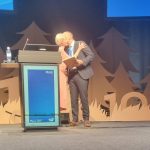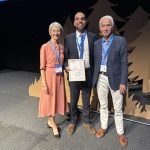Our congratulations to Dr. Stavros Tsagkaris, from the Evelina London Children’s Hospital in London, UK and the David Marsden Award 2024 for his paper:
Metabolic Patterns in Brain 18F-fluorodeoxyglucose PET Relate to Aetiology in Paediatric Dystonia
On Saturday 29 June Dr. Tsagkaris was presented with the award by Dystonia Europe Executive Director Monika Benson at the Basal Ganglia Session at the 10th EAN (European Academy of Neurology) Congress in Helsinki, Finland. Dr Tsagkaris expressed his thanks to Dystonia Europe for the award and then presented the work of his research. Dr. Jean-Pierre Lin from Evelina London Children Hospital had also come to Helsinki to celebrate this important event of his fellow Dr. Tsagkaris. “The award of the Dystonia Europe David Marsden Prize to Dr Stavros Tsagkaris represents a significant recognition of the importance of our work in investigating brain activity patterns in childhood and adolescent dystonias representing a 20-year project to carefully unravel the mechanisms of dystonia in children and young people.” says Dr. Lin.
Monika Benson, Executive Director of Dystonia Europe says: “We are delighted that this year’s award goes to Dr. Tsagkaris for his important research on children with dystonia, since this is a field of research within dystonia that needs much more focus. We wish Dr. Tsagkaris good luck and look forward to follow his work”.
About the winner:
Dr Tsagkaris is a senior Paediatrics trainee in London, UK. He is an aspiring Paediatric Neurologist, entering Neurology training.
Dr Tsagkaris completed his medical degree in National and Kapodistrian University of Athens, Greece. He completed a clinical research fellowship at Evelina London Children’s Hospital Complex Motor Disorders Service under the supervision of Dr Jean-Pierre Lin, in collaboration with King’s College London PET Imaging Centre, as a member of Professor Alexander Hammers’ team.
His ongoing research work focuses on the field of movement disorders and particularly dystonia in children, focusing on neuroimaging, neurophysiology and neuromodulation. Dr Tsagkaris’ special interest is functional neuroimaging in children with dystonia, aiming to deepen our understanding of the pathophysiology of the disease.
About the research:
The exact mechanisms via which dystonia symptoms develop are not clearly understood. Brain imaging is a great way to unravel abnormalities that could be related to the disease. There has been extensive research on the structural brain abnormalities related to development of dystonia. However, there is a relative lack of imaging markers revealing the functional characteristics of different brain regions in dystonia, especially in the paediatric population. One way to assess the function of brain areas is Positron Emission Tomography (PET) scanning, where a glucose analogue is injected into the bloodstream and brain images are taken after absorption, to reflect the glucose uptake in the brain.
Dr Tsagkaris along with his colleagues examined the glucose uptake patterns in the brains of patients with different types of dystonia, including genetic as well as acquired dystonia cases. The researchers found that, on the one hand, most aetiologic subgroups shared some patterns of glucose metabolism, possibly reflecting innate characteristics of dystonia. On the other hand, the different groups also had “signature” characteristics, which distinguished them from the rest and therefore pointed towards distinct pathophysiological mechanisms.
The results offer further insights into the pathophysiology of dystonia, enhancing our understanding of the underlying biological mechanisms related to the disease. The various areas of altered brain metabolism revealed from this study relate to disease phenotype, suggesting their potential function on controlling movement and posture. They also introduce the possibility of PET scanning imaging patterns potentially being used as a biomarker for the various disease groups in the future.
Moreover, in combination with information obtained by structural neuroimaging as well as neurophysiology testing, this research work can help better inform decisions on management options, including deep brain stimulation, providing more individualized patient care.
About the award:
The Award was an idea of late former President of European Dystonia Federation Didi Jackson from Germany.
Late Professor David Marsden was the Dean of the Institute of Neurology in Queen Square in London and he was one of the founding members of the Movement disorder society. Many movement disorder experts across Europe and beyond first learned about dystonia from Professor Marsden. He especially encouraged young scientists to become involved in the field. When Dystonia Europe was founded in 1993 Professor Marsden gave us a lot of good advice, and took a genuine interest in the development of our organisation. It was therefore entirely appropriate that David Marsden should be honoured by an Award given by patients in his name.
The David Marsden Award was first presented in 2003 to Professor Mark Edwards. Since then there has been a total of 12 awards. In the beginning the award was every other year but from 2020 it is an annual award. Next call for applications for the David Marsden Award of 2025 will start from 1 September.
- Dr. Stavros Tsagkaris with the DMA2024
- Receiving the award from Dystonia Europe Executive Director Monika Benson
- Presentation at the Basal Ganglia Club session at the EAN 2024 in Helsinki in Finland.
- Monika and Stavros together with Dr. Jean-Pierre Lin from Evelina London Children Hospital
- The winner and Dr. Jean-Pierre Lin with Professor Marina de Koning-Tijssen from the Netherlands.
- Celebration dinner in Helsinki together with DE board member from Finland Jukka Sillanpää
- Thanks for the great work!
Monika Benson
Executive Director
Dystonia Europe








